Montana
Trans women awarded $66k after being denied gender-affirming care
“No employee should have to tolerate being denied insurance coverage for their medically necessary health care solely because they are Trans”

BILLINGS, Mt. – A Trans woman in Montana was awarded compensation last week after she was denied gender-affirming healthcare under a county health benefits plan in what LGBTQ+ advocates are hailing as a “win for transgender rights” in the state.
The Montana Department of Labor and Industry Office of Administrative Hearings awarded Eleanor Andersen Maloney, a former prosecutor in the Yellowstone County attorney’s office, over $66,000 in damages for the discrimination she endured while working for the county – which includes Billings, Montana’s largest city.
The decision comes after a 2020 ruling from an administrative law judge at the Montana Human Rights Bureau that found Yellowstone County’s ban on gender-affirming care constitutes unlawful sex discrimination, violating the Montana Human Rights Act.
That ruling came after the U.S. Supreme Court ruled in the landmark Bostock v. Clayton County, extending Civil Rights Act protections to LGBTQ+ people in employment. Since, President Joe Biden has expanded the ruling to include other areas, like housing, education and health care.
The compensation also comes at a time when states across the country are issuing guidance confirming that excluding gender-affirming care from health benefits plans is discriminatory. According to the American Civil Liberties Union (ACLU) of Montana, 21 states, including Montana, and the District of Columbia have established that such exclusions are unlawful.
“I’m grateful that the rights of LGBTQIA+ Montanans are vindicated today,” said Eleanor Andersen Maloney in a press release.
The damages cover lost compensation and earnings because of Maloney’s “constructive discharge” – when a person resigns due to a hostile or intolerable work environment.
“Eleanor’s victory should send a message to policymakers and employers around the country that denying health care to transgender people is costly,” said Malita Picasso, staff attorney with the ACLU LGBTQ & HIV Project, in the release.
According to Picasso, multiple ACLU clients have sued over the denial of gender-affirming care and have received compensation.
“No employee should have to tolerate being denied insurance coverage for their medically necessary health care solely because they are transgender,” she said. “A person shouldn’t be forced to ask a court just to receive medically necessary health care, but this victory reaffirms that when trans people fight back, we win.”
Montana
Montana Supreme Court blocks ban on healthcare for trans youth
‘Today’s ruling permits our clients to breathe a sigh of relief’

The Montana Supreme Court on Wednesday ruled that SB 99, a 2023 Montana law that bans life-saving gender-affirming care for transgender youth, is unconstitutional under the Montana Constitution’s privacy clause, which prohibits government intrusion into private medical decisions. This ruling will allow Montana communities and families to continue accessing medical treatments for transgender minors with gender dysphoria, the ACLU announced in a statement.
“I will never understand why my representatives are working to strip me of my rights and the rights of other transgender kids,” Phoebe Cross, a 17-year-old transgender boy told the ACLU. “Just living as a trans teenager is difficult enough, the last thing me and my peers need is to have our rights taken away.”
“Fortunately, the Montana Supreme Court understands the danger of the state interfering with critical healthcare,” said Lambda Legal Counsel Kell Olson. “Because Montana’s constitutional protections are even stronger than their federal counterparts, transgender youth in Montana can sleep easier tonight knowing that they can continue to thrive for now, without this looming threat hanging over their heads.”
“We are so thankful for this opportunity to protect trans youth, their families, and their medical providers from this baseless and dangerous law,” said Malita Picasso, Staff Attorney for the ACLU’s LGBTQ & HIV Project. “Every day that transgender Montanans are able to access this care is a critical and life-saving victory. We will never stop fighting until every transgender person has the care and support they need to thrive.”
“Today’s ruling permits our clients to breathe a sigh of relief,” said Akilah Deernose, Executive Director of the ACLU of Montana. “But the fight for trans rights is far from over. We will continue to push for the right of all Montanans, including those who are transgender, to be themselves and live their lives free of intrusive government interference.”
The Court found that the Plaintiffs were likely to succeed on the merits of their privacy claim, holding: “The Legislature did not make gender-affirming care unlawful. Nor did it make the treatments unlawful for all minors. Instead, it restricted a broad swath of medical treatments only when sought for a particular purpose. The record indicates that Provider Plaintiffs, or other medical professionals providing gender-affirming care, are recognized as competent in the medical community to provide that care.[T]he law puts governmental regulation in the mix of an individual’s fundamental right ‘to make medical judgments affecting her or his bodily integrity and health in partnership with a chosen health care provider.’
Two justices filed a concurrence arguing that the Court should also clarify that discrimination on the basis of transgender status is a form of sex discrimination prohibited by Montana’s Equal Protection Clause, the ACLU reported.
Montana
Montana court hears arguments defining sex as ‘male’ or ‘female’
The bill drew national attention from critics, who said it left no place for those who don’t fit a biologically narrow definition
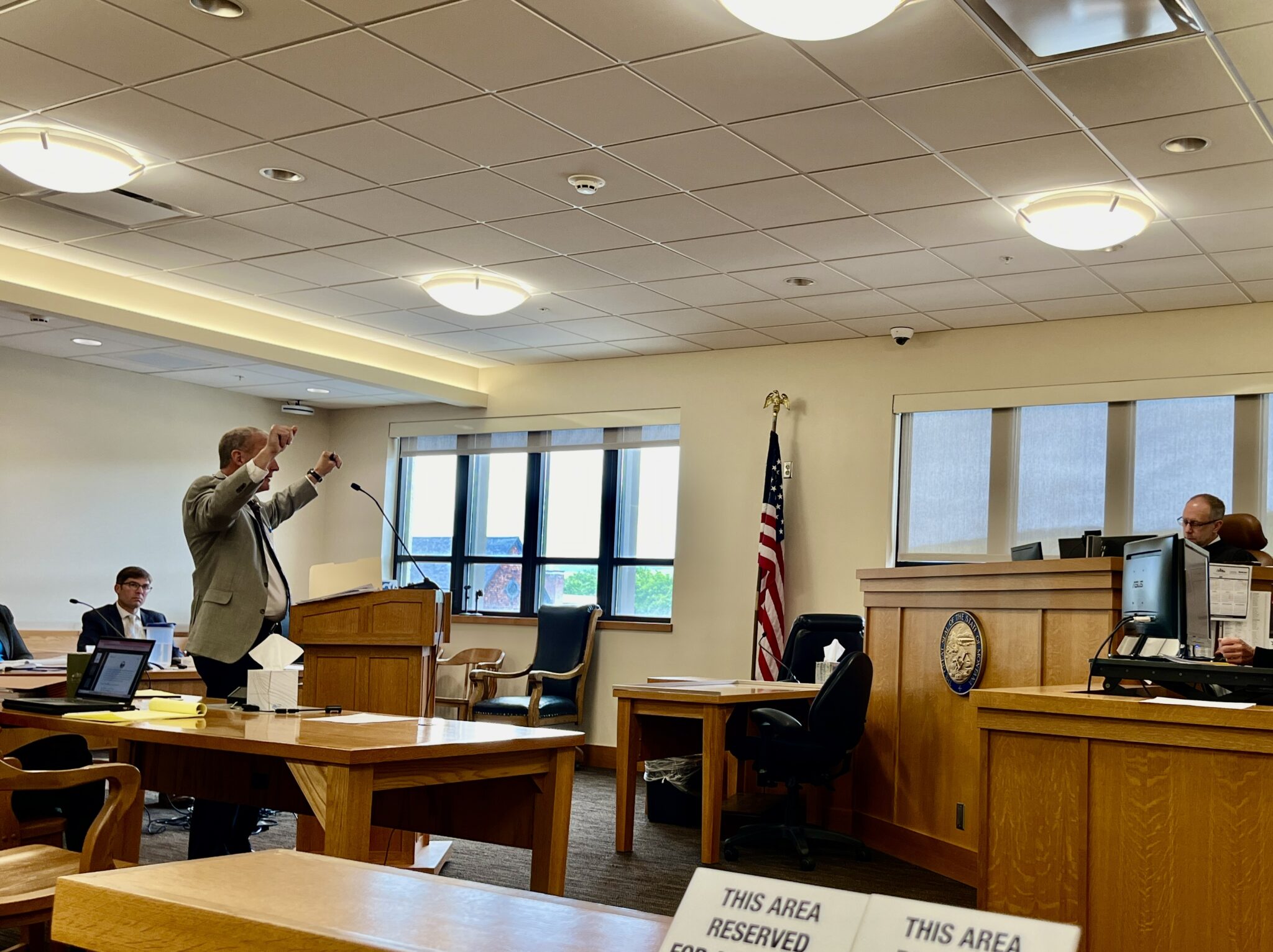
By Keila Szpaller | MISSOULA, Mont. – Defining “sex” makes some people think back on the President Bill Clinton and Monica Lewinsky scandal — so said lawyer Kyle Gray on Tuesday in Missoula County District Court.
In that case, the president swore he didn’t have “sexual relations” with a White House intern, but questions swirled around what exactly had been happening in the Oval Office when it came to sex.

(Keila Szpaller/The Daily Montanan)
Gray, representing plaintiffs in a lawsuit over a 2023 bill that defines “sex,” said the word can mean sexual intercourse as much as it can refer to “male” and “female.”
Senate Bill 458, the subject of litigation, aims to define sex as “male” or “female.”
The Montana Constitution, however, says the public needs to have a clear idea of the topic of a bill, and that a bill must have “only one purpose.” As such, Gray argued SB 458 missed the mark.
The bill’s title is “an act generally revising the laws to provide a common definition for the word sex when referring to a human.” It lists 41 sections of law to be revised.
“It’s the poster boy for violating the single-subject clearly expressed in the title of the bill,” said Gray, of Holland & Hart.
On behalf of the State of Montana, however, attorney Thane Johnson told Judge Shane Vannatta the point of the “single subject” rule is to prevent fraud and deception. It ensures a bill isn’t hiding things or keeping information under wraps, he said, and SB 458 spells out its plan for updates.
SB 458 defines sex as male or female, and Johnson said the title “puts the world on notice” of its intent for numerous updates. Additionally, he said, a title can’t rule out all other interpretations without going on at length.
“Plaintiffs’ argument would lead to absurd results because our title would just … fill up pages,” Johnson said.
In 2023, the Montana Legislature adopted the controversial bill that defined sex based on people’s reproductive organs and the cells they produce at the time of birth.
In response, the American Civil Liberties Union of Montana sued the state of Montana on behalf of Shawn Reagor, Dandilion Cloverdale, Jamie Doe, Linda Troyer and Jane Doe, alleging the law “is hopelessly confusing, overbroad, and … invades the province of the courts.”
The bill drew national attention from critics, who said it left no place for people who don’t fit the biologically narrow and unscientific definition. The Human Rights Campaign referred to it as the “LGBTQ+ Erasure Act.”
Tuesday, however, the parties argued only about whether the bill’s title got crosswise with the Montana Constitution’s requirement that a bill generally address only one topic, and that its title clearly expresses it.
In the argument for the state, Johnson said the title did refer to a common definition of sex, and he pointed to Webster’s Dictionary as one piece of evidence. He also explained the rationale behind the bill as addressing an idea that’s emerged in the last 10 years or so.
“The legislature just felt the need to define that term more clearly under the concept of modern times, and I don’t think there’s any question that this is the state of affairs that we are in,” Johnson said.
Although Johnson said the bill meets the single subject requirement, he said he believes it fits better as one of the exceptions to the rule. To that end, he peeled apart the requirement in Article 5 Section 11 subsection 3 of the state constitution:
“Each bill, except general appropriation bills and bills for the codification and general revision of the laws, shall contain only one subject, clearly expressed in its title. If any subject is embraced in any act and is not expressed in the title, only so much of the act not so expressed is void.”
Johnson argued the constitution allows for three exceptions — appropriation bills, codification bills, and general revision bills — and said SB 458 fit the exception given it was “generally revising” the law.
But he said the bill is constitutional either way, whether it’s an exception to the rule, as he believes, or it’s not.
Vannatta asked Johnson about “male” and “female” not being in the title, and Johnson pointed out the title refers to “humans.” Vannatta also wanted to know how the state responded to sex referring also to intercourse, but Johnson said the court is “obligated to liberally construe the definition.”
Vannatta had asked the plaintiffs whether the concepts of “male” and “female” don’t naturally flow from the term “sex,” as the defendants allege. Gray countered that defining sex led her to think of the political scandal with Clinton.
Gray also said the language about bill titles had never been interpreted the way the state was interpreting it. She said the point is to ensure the public knows what is taking place, and a reference to “generally revising” in the title doesn’t cut it.
“A bill generally revising laws about dogs wouldn’t tell you that the legislature has decided to outlaw rabies,” Gray said as an example.
In this case, Gray said the title appears to be “very deceptive,” although she said it’s possible no one thought about other definitions.
Regardless, she said, the title of the bill doesn’t give the public an idea of the way the law would change things in practice.
For example, she said, with its definition of sex as “male” or “female,” is Montana saying a hospital can discriminate against admitting a person who is transgender or intersex?
“Well, if they’re saying that, certainly the public wants to know,” Gray said.
Also, what do sex and gender have to do with interstate signage or building codes? Gray said some issues relate to gender, but some “make no sense at all,” and the public would need to dig into the subject matter to find out.

(Keila Szpaller/The Daily Montanan)
After the hearing, Vannatta said he would take the request for summary judgment under advisement and rule when possible.
If the judge finds in favor of the plaintiffs, the law will be off the books, said Alex Rate, lawyer for the ACLU of Montana.
However, if the judge finds in favor of the state, the court will consider the second claim from plaintiffs, he said; they also argue it is up to the courts, not the legislature, to determine the definition of sex because it’s part of the Equal Protection clause of the constitution.
That issue wasn’t the subject of Tuesday’s hearing.
Reagor, one of the plaintiffs, said the courtroom heard just one of the arguments the bill was unconstitutional, but it’s not the only one: “I think it’s really disappointing that so many taxpayer dollars are being wasted on defending bills that are malicious and that legislators knew were unconstitutional when they passed them.”
******************************************************************************************

Keila Szpaller is deputy editor of the Daily Montanan and covers education. Before joining States Newsroom Montana, she served as city editor of the Missoulian, the largest news outlet in western Montana.
******************************************************************************************
The preceding article was previously published by The Daily Montanan and is republished with permission.
The Daily Montanan is a nonprofit, nonpartisan source for trusted news, commentary and insight into statewide policy and politics beneath the Big Sky.
We’re part of States Newsroom, the nation’s largest state-focused nonprofit news organization.
Montana
Great Falls, Montana mayor: No Pride Month proclamation
A resident noted Reeves issued proclamations for other groups in the community, but it was “discriminatory” not to include Pride among them
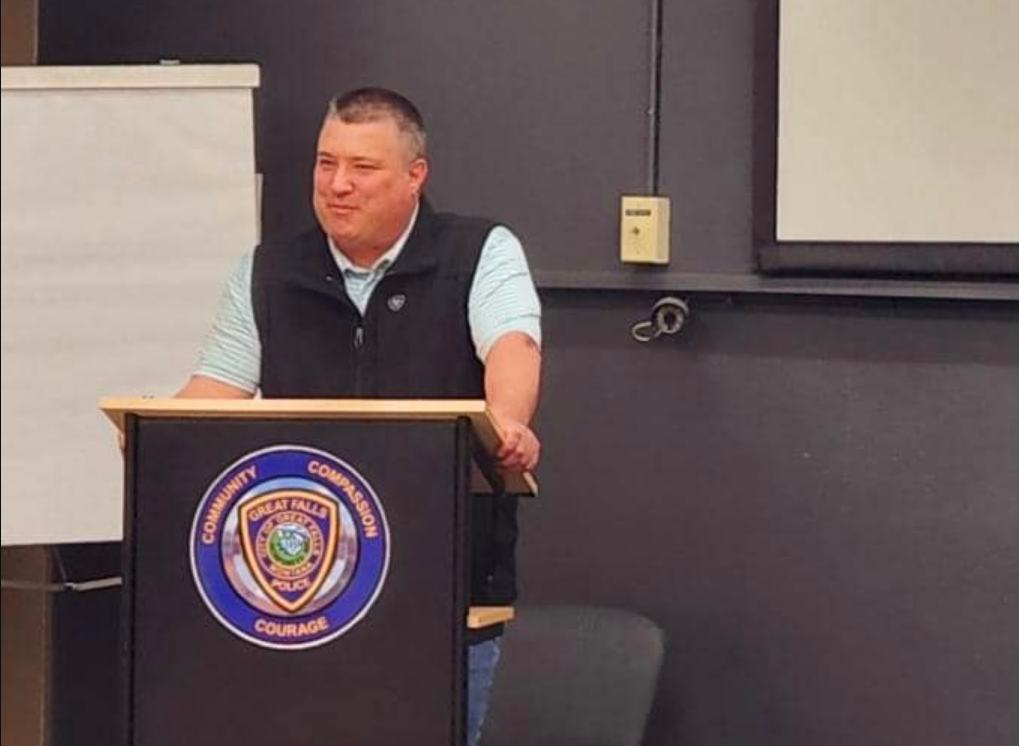
By Nicole Girten | GREAT FALLS, Mont. – A dozen people came to a meeting this week to protest Great Falls Mayor Corey Reeves’ decision not to issue a pride proclamation for the month of June.
Reeves, who took the nonpartisan office in January, said on social media the government should not “condemn nor celebrate who should love who.”
“While I firmly believe in equality for all individuals, I also believe that the government should not be involved in matters concerning personal and private relationships, whether they involve straight individuals or members of the LGBTQ+ community,” Reeves said in a Facebook post Monday.
Two commissioners of the four total spoke to the importance of recognizing the LGBTQ community during Pride Month at the end of their meeting, with Susan Wolff saying she was “not complicit with that decision.” But another commissioner, Rick Tryon, said he supported Reeves’ post and said people saying the city was homophobic were “ignorant.”
When reached for comment Wednesday, Reeves said his Facebook post spoke for itself.
“I want government out of who we love,” Reeves said in an emailed response.
Great Falls resident Stacy Kony’s voice quivered as she spoke through tears to city commissioners.
“I don’t wear rainbow items to tell you who’s in my bed,” she said. “I wear rainbow and trans colors so the family across the street will feel a little safer in my neighborhood. So the couple in the restaurant knows they aren’t alone. So the boy who sees me notice him looking at dresses knows I won’t judge.
“Right now, here in Great Falls, there is a young person who believes that they’d be better off dead than trans or gay. I wear my pride because you would have them hide.”
President of the local LGBTQ+ Center Matt Pipinich said Reeves’ post was harmful, but he knew the mayor didn’t intend to be hurtful.
“Cory, I’ve known you for a long time and I know you’re not homophobic, and I know that wasn’t your intent,” Pipinich said. “I would really like for you guys to reach out to the LGBTQ Center and see if we can be a part of the solution.”
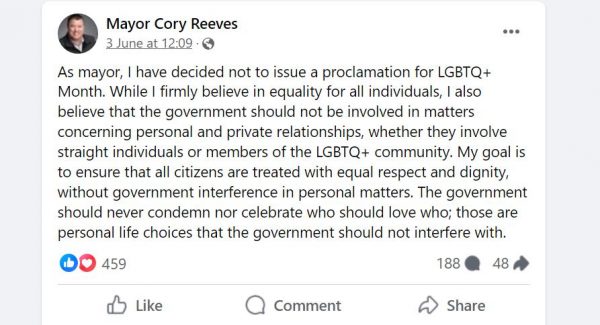
A handful of commenters spoke to how LGBTQ+ youth are more likely than their peers to commit suicide.
“According to the Trevor Project, LGBTQ plus youth are at higher risk for suicide because of how they are mistreated and stigmatized by society,” said Rev. Lynne Spencer-Smith of United Church of Christ. “A Pride Month proclamation would be a message of hope and encouragement from the leadership of their community to those youth.”
Local activist and former Democratic candidate Jasmine Taylor listed a series of atrocities the LGBTQ+ community have faced in the past century, from gas chambers in the Holocaust to last year’s incident in Great Falls where woman was killed, allegedly for her transgender identity.
“There is not a straight pride month because people were never marched into gas chambers for being heterosexual. Straight people have never been beaten, tortured, tied to fences, run over or had their houses set on fire because of their sexual orientation or gender identity,” Taylor said.
Taylor noted Reeves had issued proclamations for other groups in the community, but it was “discriminatory” not to include Pride among them.
“You have singled out this specific minority group and decided we are not worthy of recognition,” she said.
Tryon said he agreed with Reeve’s decision not to make the proclamation, but took umbrage with what he saw as the commenters accusing the city of being homophobic.
“Implying that anybody on the City Commission or the mayor was doing something out of some homophobic or bigoted motivation is wrong,” Tryon said. “Nobody up here is homophobic or wants to see anybody, for any reason, commit suicide or to be hated on by anybody in this community.”
Tryon went on to say there are “dark corners” of Great Falls, like in any other city, where people have hateful tendencies including against the LGBTQ+ community, “but that does not reflect on the official business or the official stance of this city or of the mayor.”
The mayor has the sole discretion to issue proclamations, which are purely ceremonial and typically celebrate noteworthy events relevant to the community. According to the city’s proclamation guidelines proclamations are not issued for:
- Matters of political or religious nature or individual conviction
- Matters with potential political controversy or which may suggest an official City position on a matter whether or not under consideration or to be voted upon by the City Commission
- Events or organizations with no direct relationship to the city of Great Falls
Commissioner Shannon Wilson, part of the progressive group Great Falls Rising, said not every group or cause can be recognized at commission meetings, “but we try and do our best.”
“The LGBTQ community deserves our recognition as no other group receives more hate incidents and discrimination than their community,” Wilson said. “They aren’t looking for special rights. They’re just looking for equal rights.”
Wolff said she felt the rest of the commission looked “complicit” in the mayor’s decision to not issue a proclamation, and said she was “not complicit.”
“I’m not sure where the mayor may want to go with this, but it was upsetting to me for all the reasons that we heard tonight,” Wolff said.
******************************************************************************************

Nicole Girten is a reporter for the Daily Montanan. She previously worked at the Great Falls Tribune as a government watchdog reporter. She holds a degree from Florida State University and a Master of Science from the Medill School of Journalism at Northwestern University.
******************************************************************************************
The preceding article was previously published by The Daily Montanan and is republished with permission.
The Daily Montanan is a nonprofit, nonpartisan source for trusted news, commentary and insight into statewide policy and politics beneath the Big Sky.
We’re part of States Newsroom, the nation’s largest state-focused nonprofit news organization.
Montana
ACLU asks court: Stop Montana state agencies harming trans folks
ACLU argues the rule violates the right to privacy, which the Montana Constitution says is “essential to the well-being of a free society”
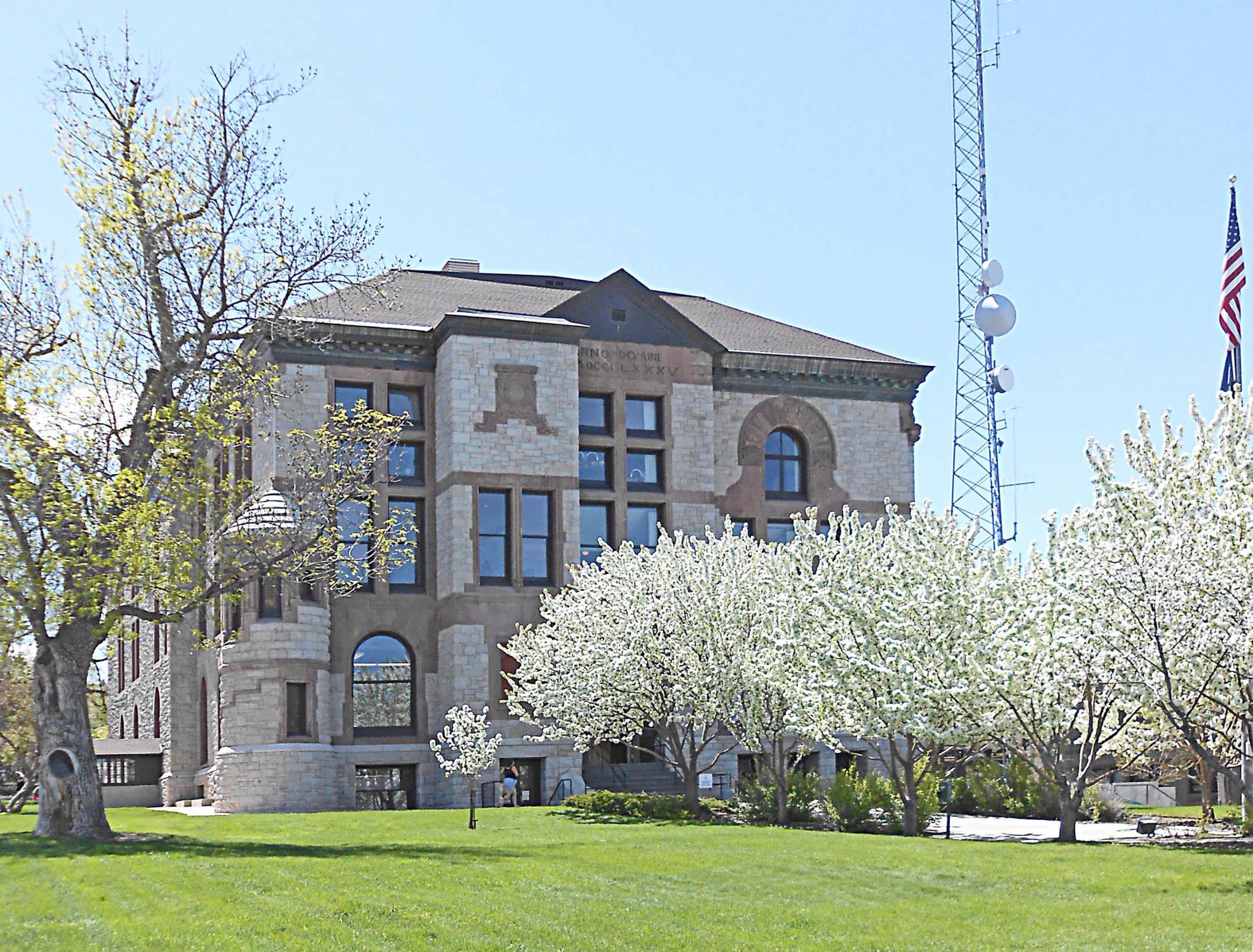
By Keila Szpaller | HELENA, Mont. – People who are transgender need to be able to amend their birth certificates and driver’s licenses without interference from the state of Montana, plaintiffs in a lawsuit argued this week in a request for a preliminary injunction.
So the Lewis and Clark County District Court should block the Department of Public Health and Human Services and the Department of Justice from unconstitutionally preventing them, the plaintiffs said.
The status quo not only violates the constitutional rights of transgender Montanans, it causes harm, said the motion filed Thursday.
“Uncorrected identity documents serve as constant reminders that one’s identity is perceived by society and the government as ‘illegitimate,’” said the ACLU Montana in the filing.
The result can exacerbate gender dysphoria — a serious medical condition associated with incongruity between assigned sex and gender identity — and cause psychiatric disorders and even the risk of suicide, the plaintiffs said.
On the other hand, The World Professional Association for Transgender Health states that “changing the sex designation on identity documents greatly helps alleviate gender dysphoria,” the filing said.
Last month, the ACLU Montana filed a lawsuit on behalf of Jessica Kalarchik, Jane Doe, and “all others similarly situated” alleging Gov. Greg Gianforte, the Department of Public Health and Human Services, and the Department of Justice are violating the constitutional rights of transgender people.
The plaintiffs argue people who are transgender used to be able to amend their birth certificates without issue and without negative consequences to the state.
However, a 2022 rule through the health department, a new Motor Vehicle Department practice through the DOJ, and Senate Bill 458 treat them differently than cisgender people — whose gender identity corresponds to their assigned sex — and infringes on their rights.
“The 2022 Rule, the new MVD policy and practice, and SB 458 are solutions in search of a problem,” the plaintiffs said.
A spokesperson for Gianforte earlier said the governor stands by the bill he signed in 2023 “that brings the long-recognized, commonsense, immutable biologically-based definition of sex — male and female — into our state laws.”
The state health department earlier said it does not typically comment on pending litigation. The Department of Justice earlier denied the MVD had changed its policy on updating a sex designation on a driver’s license.
This week, the plaintiffs asked the court for a preliminary injunction to stop enforcement of the rule, practice and law, citing infringement of their constitutionally protected rights.
They also asked the court to certify the lawsuit as a class action on behalf of all Montanans who are transgender and need to change their birth certificates and driver’s licenses.
The American Civil Liberties Union Foundation of New York and Nixon Peabody of Chicago also are representing plaintiffs, pending approval from the court.
DPHHS Director Charlie Brereton and Attorney General Austin Knudsen also are sued as heads of state agencies.
Different law, same fight
Starting in 2017, people who were transgender could change their sex designations by submitting an affidavit to the health department.
In 2021, the Montana Legislature adopted Senate Bill 280, which restricted the ability of people who are transgender to change their birth certificates. But in a separate lawsuit, the court temporarily halted the law and ordered the health department to use the 2017 process instead.
“DPHHS pointed to no adverse consequence of having had to revert to the 2017 procedure,” said the filing this week.
The district court permanently enjoined SB 280 in 2023 and also found DPHHS to be in contempt for “openly and repeatedly defying” its order.
In February 2024, however, the state health department said it wouldn’t amend birth certificates based on gender identity, but only to correct errors, citing an administrative rule from 2022 and its alignment with Senate Bill 458.
Signed by Gianforte in 2023, SB 458 states that “there are exactly two sexes, male and female … (and) the sexes are determined … without regard to an individual’s psychological, behavioral, social, chosen or subjective experience of gender.”
The DOJ took action this year as well, ending the prior practice at the MVD of allowing changes to sex based on a letter from a doctor stating the person was changing or had changed their gender, according to the court filing.
“Instead, without following any notice-and-comment procedure, the DOJ and Attorney General Austin Knudsen adopted a new policy and practice that the MVD would only issue an amended driver’s license with a sex designation consistent with a person’s gender identity, rather than their assigned sex at birth, if the person provided an amended birth certificate — which the 2022 Rule prohibits transgender people from obtaining,” said the filing.
Constitutional rights violated, plaintiffs allege
The plaintiffs argue the changes violate multiple constitutional rights.
They violate their right to equal protection because the health department and MVD “single out transgender people for different and less favorable treatment vis-a-vis cisgender people,” the filing said.
The rule and practice also don’t serve a compelling state interest, the plaintiffs said.
In fact, 45 other states allow transgender people to amend their sex markers on their birth certificates, and 38 allow them to change the same on their driver’s licenses without an amended birth certificate, the filing said.
“Many of these states have allowed these changes to birth certificates and driver’s licenses for years without any widespread problems with the ability of those states to maintain ‘accurate vital statistics,’” the filing said.
They noted Montana was in the same boat earlier, making changes at the health department “without incident” from 2017 until the 2021 law was adopted.
The plaintiffs also argue that the rule, MVD practice and law violate the right to privacy, which the Montana Constitution says is “essential to the well-being of a free society.”
The state says that right shall not be infringed without a compelling state interest,” and the plaintiffs note the state affords even broader privacy protections than the federal constitution.
And they said health information is personal, sensitive and private.
“The mental and emotional toll of being forced, against one’s will, to publicly share personal information related to one’s transgender status is both humiliating and degrading,” the plaintiffs said.
If transgender people can’t change their birth certificates, they’re forced to reveal their transgender status every time they’re required to show those documents, the plaintiffs said.
“This forced ‘outing’ has serious adverse psychological effects and health consequences and often results in outright hostility toward transgender people,” said the court filing.
“Conversely, transgender people whose identity documents are consistent with the way they present themselves to the public experience better mental health and less mistreatment.”
The plaintiffs cited a study that said transgender people who changed their sex designation on documents were 35% less likely to have experienced related mistreatment than those who hadn’t made the changes.
“Other studies have shown that accurate identity documents promote economic benefits, including higher rates of employment and increased income,” the plaintiffs said.
They noted nearly one-third of transender people fall below the poverty line and the same number have experienced homelessness.
The state also is forcing people who are transgender to “express or embrace a viewpoint to which they disagree,” in violation of the right to be free from compelled speech, the plaintiffs allege.
Rather, transgender people are forced to carry and present identity documents with a sex designation that conflicts with what they know their sex to be and one that forces them to “disseminate the state’s view of their sex,” the plaintiffs argue.
The rule, policy and law are also “scientifically incorrect,” said the court filing.
“They ignore the existence of multiple genes involved in sex differentiation; the breadth of the endocrine system, which has multiple organs with multiple functions; and growing research documenting that gender identity is biologically based,” the plaintiffs said.
Class certification request
The plaintiffs also propose a class that includes all transgender people in Montana who want to change sex designations on their birth certificates or driver’s licenses.
Citing a study, the filing estimates roughly 0.41% of Montanans over 18 identify as transgender, or more than 3,400, and an estimated 49% don’t have documents that reflect the sex to which they identify, or some 1,700.
It said a class action case would account for the high number of potential plaintiffs, their geographic dispersion in a state such as Montana, the resources of the court, the resources of individual class members, and their vulnerability to threats of violence.
“Proceeding as a class diminishes the salience of such threats to any individual class member, as there is both safety in numbers and relative anonymity for class members,” said the request for class certification.
******************************************************************************************

Keila Szpaller is deputy editor of the Daily Montanan and covers education. Before joining States Newsroom Montana, she served as city editor of the Missoulian, the largest news outlet in western Montana.
******************************************************************************************
The preceding article was previously published by the Daily Montanan and is republished with permission.
The Daily Montanan is a nonprofit, nonpartisan source for trusted news, commentary and insight into statewide policy and politics beneath the Big Sky.
We’re part of States Newsroom, the nation’s largest state-focused nonprofit news organization.
Montana
ACLU sues Montana over gender markers on driver’s licenses
The Montana Department of Justice quietly adopted a new policy for changing gender markers on Montana driver’s licenses
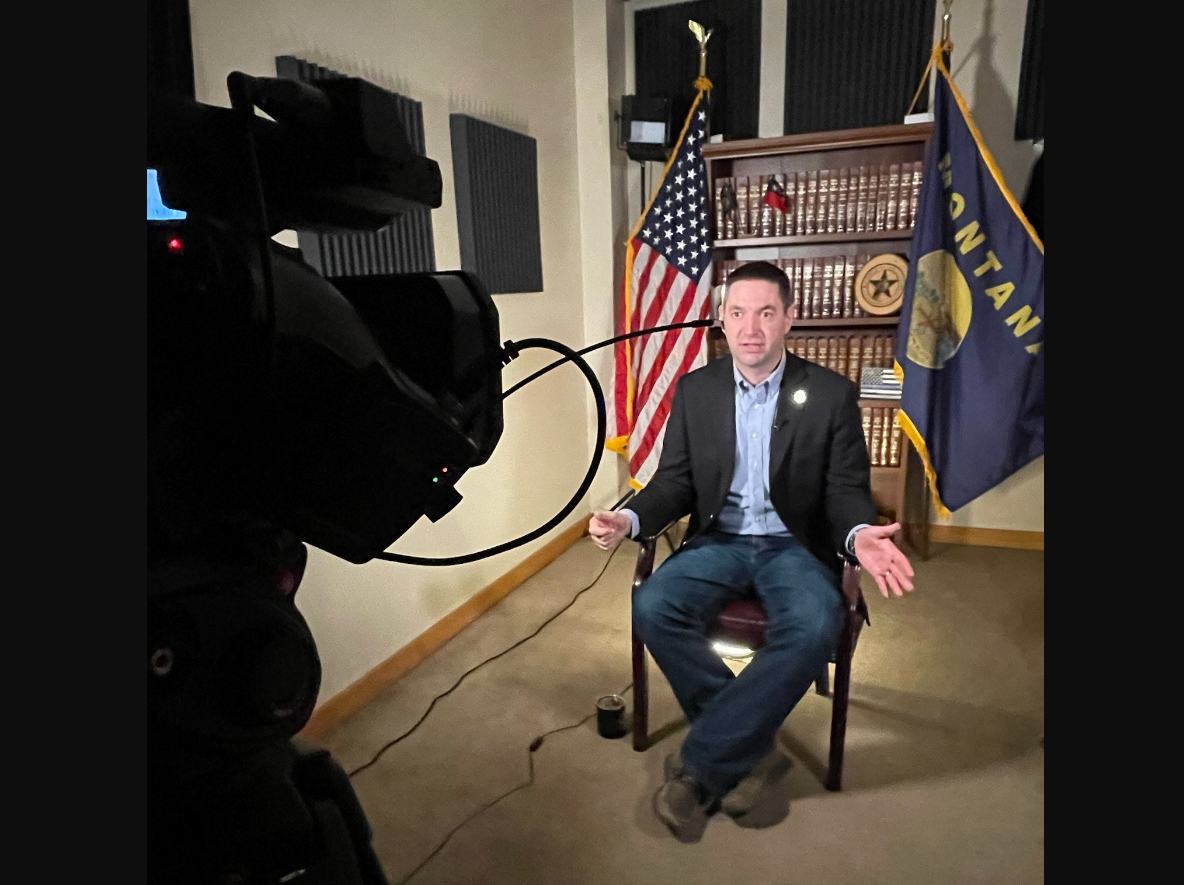
By Nicole Girten | HELENA, Mont. – The Montana Department of Justice quietly adopted a new policy for changing gender markers on Montana driver’s licenses that would require transgender Montanans to provide an amended birth certificate, as opposed to only requiring a note from a doctor.
That’s according to a class action lawsuit filed by the ACLU of Montana on Thursday, which is asking the court to declare the new Motor Vehicle Division policy unconstitutional. The lawsuit targets a rule enacted by the state’s health department in 2022 which plaintiffs claim bans transgender applicants from changing the sex marker on their birth certificate.
This lawsuit follows other legal challenges in recent years involving legislation and rules regarding changing gender markers on birth certificates in the Treasure State. A law passed during the 2021 legislature restricting changes to birth certificates was found unconstitutional and there are two other ongoing lawsuits surrounding a 2023 law defining sex as binary in statute.
Defendants listed in the lawsuit include Attorney General Austin Knudsen, the Montana DOJ, Gov. Greg Gianforte, the Department of Public Health and Human Services and DPHHS Director Charlie Brereton.
A spokesperson for Gov. Gianforte said Thursday the governor “stands by the bill he signed in 2023 that brings the long-recognized, commonsense, immutable biologically-based definition of sex — male and female — into our state laws.”
“It is no surprise the ACLU would wade into Montana to challenge commonsense, immutable biological facts to advance its far left agenda,” the spokesperson said in an emailed statement.
A DPHHS spokesperson said the department does not generally comment on on-going litigation and a spokesperson for the DOJ did not respond to emailed questions in time for publication.
Plaintiffs include a former Montana resident and transgender woman, Jessica Kalarchik, who is looking to change the gender marker on her birth certificate, and Jane Doe, a transgender woman looking to change the gender marker on both her birth certificate and her driver’s license.
Plaintiffs claim the 2022 rule, the 2023 law and the new DMV protocol go against protections in Montana’s constitution.
Plaintiff Doe avoids using public restrooms and changing rooms for fear of mistreatment or violence. She’s already faced mistreatment from people in her life after coming out, according to the lawsuit.
Doe worries about showing her identification documents with her gender assigned at birth to someone who may react negatively.
“Ms. Doe is typically perceived as female, so anytime she is forced to present an identity document that incorrectly identifies her as male, she is forced to ‘out’ herself as transgender,” the lawsuit read. “As Ms. Doe’s appearance has shifted, her driver’s license no longer matches her appearance, and she has experienced increasing issues with this disparity.”
Kalarchik, 49, is a transgender woman and veteran who was born in Butte and currently lives in Anchorage, Alaska, with her wife, Renee. She’s looking to have the gender marker amended on her birth certificate for similar fears of retaliation as Doe. The lawsuit said she has previously experienced incidents of harassment and discrimination in both her personal and professional life.
Kalarchik started hormone therapy in 2022 and has legally changed her name and sex marker on both her Alaska driver’s license and her Social Security card.
The lawsuit said the 2022 rule and Senate Bill 458, which defines sex as binary and passed in 2023, prevent Kalarchik from changing the gender marker on her birth certificate.
DPHHS announced in February the department was reinstating the 2022 rule, which only allows changes to birth certificates in the event the gender marker was listed incorrectly as a result of a data entry error and does not authorize changes “based on gender transition, gender identity, or change of gender.”
“The effect of the 2022 Rule is to categorically ban transgender applicants from obtaining birth-certificate amendments to reflect the sex they know themselves to be,” the lawsuit said.
The rule was first enacted as the state was in ongoing litigation surrounding a similar law passed in 2021, Senate Bill 280, which restricted transgender Montanans’ ability to amend the gender markers on their birth certificates.
The court temporarily blocked SB 280 in 2022, and the state needed to re-institute the previous process for changing birth certificates as litigation continued – which only required an applicant to submit a supporting affidavit. But the state did not, and instead passed the 2022 rule. The court found the state in contempt for going against the preliminary injunction and also found SB 280 to be unconstitutional.
In February, DPHHS said the 2022 rule aligns with SB 458, the sex definition bill sponsored by Sen. Carl Glimm, R-Kila, who also sponsored SB 280. There are two open lawsuits against SB 458. Brereton said in the February announcement DPHHS “must follow the law, and our agency will consequently process requests to amend sex markers on birth certificates under our 2022 final rule.”
Plaintiffs are claiming the 2022 Rule, the new MVD policy, and SB 458 (within the context of amending birth certificates and driver’s licenses) are not constitutional. The lawsuit argues the policies violate protections in the Montana constitution for privacy, equal protection under the law, and against compelled speech.
The lawsuit says the policies are inherently discriminatory and require compelled speech in that in order to comply, transgender people have to “misidentify themselves by a sex designation that does not accurately state their sex.”
The filing said the “essential danger” of these policies are they “require transgender Montanans to carry identity documents that are contrary to the sex they know themselves to be” and therefore increase risk of potential discrimination or violence.
Plaintiffs are asking to establish a class that would include all transgender people born in Montana who currently or in the future wish to change the gender marker on their birth certificate or driver’s license.
Postscript
After publication, the Montana Department of Justice reached out to the Daily Montanan to say the Motor Vehicle Division’s policy to change a sex marker has not changed.
******************************************************************************************

Nicole Girten is a reporter for the Daily Montanan. She previously worked at the Great Falls Tribune as a government watchdog reporter. She holds a degree from Florida State University and a Master of Science from the Medill School of Journalism at Northwestern University.
******************************************************************************************
The preceding piece was previously published by the Daily Montanan and is republished with permission.
The Daily Montanan is a nonprofit, nonpartisan source for trusted news, commentary and insight into statewide policy and politics beneath the Big Sky.
We’re part of States Newsroom, the nation’s largest state-focused nonprofit news organization.
Montana
Montana returns to near ban on trans birth certificate changes
The agency’s announcement reignites a civil rights feud with transgender residents that was the subject of a prior lawsuit

By Mara Silvers | HELENA, Mont. The Montana state health department has announced its return to a near prohibition on individuals updating the sex on their birth certificates to match their gender identity, reigniting a civil rights feud with transgender residents that was the subject of a prior lawsuit.
In a Tuesday press release, the Gov. Greg Gianforte administration’s Department of Public Health and Human Services said the latest rule applies to any not-yet-adjudicated request to update the “male” or “female” category on a birth certificate submitted or pending with the department on or after Oct. 1, 2023.
The rule now in effect was originally created by the department in 2022 as a way to restrict changes to birth certificates for transgender Montanans while the agency was involved in a court battle over a related Republican law from the prior legislative session.
The rule was ultimately blocked from taking effect because of the pending litigation in the Yellowstone County case brought by the ACLU of Montana. At that point in the litigation, the judge overseeing the case slammed the department for attempting to write new rules about birth certificates before the related lawsuit had been resolved, later holding the agency in contempt of court.
However, when the law at issue, Senate Bill 280, was permanently enjoined in June of last year, the state health department was no longer barred from creating administrative rules about how to handle changes to sex on birth certificates.
In the announcement Tuesday, the department outlined the narrow circumstances that would allow an individual to change the sex listed on their birth certificate under the current rule.
“The 2022 final rule states the sex of a registrant on a birth certificate may only be corrected if the sex of an individual was listed incorrectly on the original certificate as a result of a scrivener’s error or a data entry error, or if the sex of the individual was misidentified on the original certificate,” the state health department said. “In both cases, the department must receive a correction affidavit and supporting documents consistent with the law.”
The state health department said the rule, though years old, also complies with a law from the 2023 Legislature that seeks to create a strict definition of “sex” across state government. That law, Senate Bill 458, is sponsored by the same Republican lawmaker who brought the original bill to restrict birth certificates in 2021, Sen. Carl Glimm, R-Kila.
“DPHHS must follow the law, and our agency will consequently process requests to amend sex markers on birth certificates under our 2022 final rule,” said department director Charlie Brereton in a written statement. “This notification serves to keep the public apprised of the law and what to expect from DPHHS going forward.”
While there have been legal challenges filed against SB 458 in recent months in state and federal court, the law has not been enjoined and is currently in effect.
Alex Rate, legal director of the ACLU of Montana, said the health department’s latest action is grounds for a new lawsuit against the 2022 rule and the agency’s interpretation of SB 458.
“We’ll be back in court, no doubt,” Rate told Montana Free Press Tuesday. “The new rule runs afoul of the same constitutional provisions, from dignity to privacy to equal protection.”
In explaining the grounds for a lawsuit, Rate said the rule implementation and SB 458’s effects more broadly signal the state’s prohibitive stance towards trans people.
“Once again, this latest action by the [health department] betrays the state’s deep and abiding animus towards trans people in Montana,” Rate said. “Trans people belong here. They are trying to live out their ordinary lives.”
Rate said the organization aims to file its latest lawsuit in the coming weeks but did not provide a more precise timeline.
******************************************************************************************

Mara writes about health and human services stories happening in local communities, the Montana statehouse and the court system. She also produces the Shared State podcast in collaboration with MTPR and YPR. Before joining Montana Free Press, Mara worked in podcast and radio production at Slate and WNYC. She was born and raised in Helena, MT and graduated from Seattle University in 2016.
**********************
The preceding piece was previously published by Montana Free Press and is republished with permission.
SUPPORT A FREE AND INDEPENDENT PRESS
Unbiased, unflinching journalism is critical to our democracy. When you donate to Montana Free Press, you are helping build a newsroom that serves the people of Montana, not advertisers or special interests. (Link)
Montana
State judge blocks Montana anti-trans youth healthcare law
The attorney general’s office has not said whether it intends to appeal the preliminary injunction ruling to the Montana Supreme Court
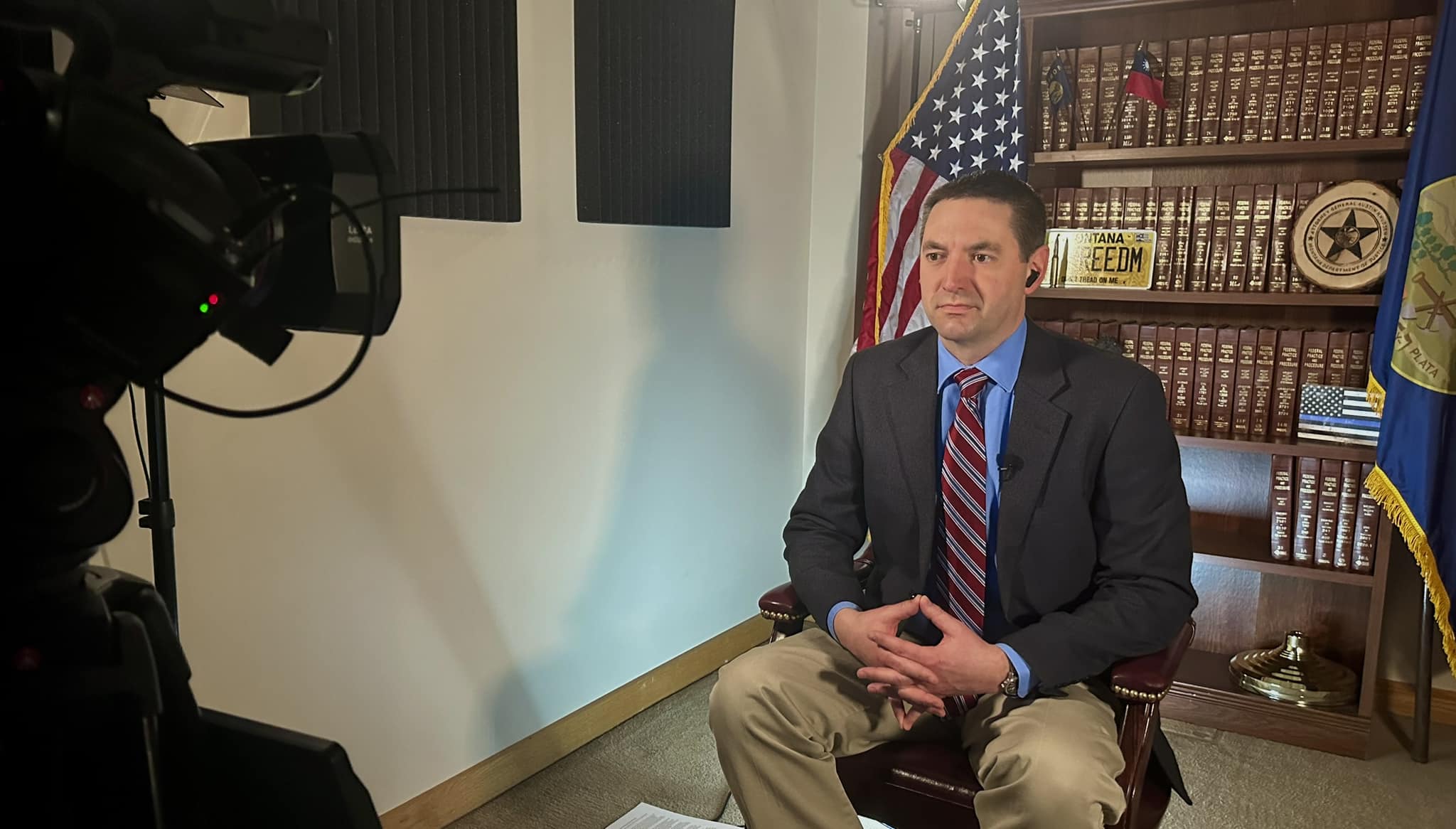
By Mara Silvers | MISSOULA, MT. – A state district court judge in Missoula has blocked Montana’s ban on medical care for minors with gender dysphoria from taking effect while a lawsuit over its constitutionality continues, finding that the new law appears to have “no rational relationship to protecting children.”
The challenge against Senate Bill 99, a Republican-backed law passed earlier this year and signed by Gov. Greg Gianforte in April, is taking place in the state court system. Other similar laws passed in other states, including Texas and Tennessee, are winding their way through federal courts. The Montana law was slated to take effect Oct. 1.
Advocates for transgender rights, the plaintiffs and their attorneys in the Montana case heralded Judge Jason Marks’ Wednesday decision as critical protection for young people and vowed to continue fighting in court against what they deem discriminatory legislation.
“Today’s ruling permits our clients to breathe a sigh of relief,” Akilah Deernose, the executive director of the ACLU of Montana, said in a Wednesday press release. The civil rights organization is one of the groups representing transgender minors, their parents and medical providers. “But this fight is far from over. We look forward to vindicating our clients’ constitutional rights and ensuring that this hateful law never takes effect.”

A spokesperson for Montana Attorney General Austin Knudsen did not respond to a request for comment before publication. Knudsen’s office is representing defendants in the case, including himself, the governor, the state health department and agency director, and medical licensing boards.
The 48-page ruling comes a week after both sides appeared in Missoula court to argue over the preliminary injunction, which blocks the state from enforcing the law while litigation proceeds.
There, the plaintiffs argued that SB 99 unconstitutionally violates Montana’s rights to equal protection, the right to parent, the right to privacy, the right to seek and obtain medical care, the right to dignity for patients and freedom of speech for medical providers. Defendants said the law should be enforced as written, asserting the state’s “compelling interest” in protecting the well-being of children.
In his ruling, Marks found that the 2023 Legislature’s record “does not support a finding that SB 99 protects minors,” writing that submitted evidence “suggests that SB 99 would have the opposite effect.” Marks also wrote that the plaintiffs were likely to eventually succeed on the merits of the case, one of the standards for temporarily blocking a law, and that SB 99 could be “unlikely to survive any level of constitutional review.”
He described the medical treatments prohibited by SB 99 as among the options for young people experiencing gender dysphoria, a diagnosed condition caused by a distressing incongruence between a person’s gender identity and the sex they were assigned at birth.
Nodding to the plaintiffs’ arguments, Marks also noted that many of the medications — including puberty blockers for adolescents and cross-sex hormones for teens — are often prescribed to minors to treat other conditions but that SB 99 would bar the provision of the same services for the purpose of treating gender dysphoria.
Defendants advocated for a non-medical “watchful-waiting” approach and suggested that many youths may eventually stop experiencing gender dysphoria without medical intervention, Marks summarized. He also noted that defendants sought to undermine professional medical organizations’ support for gender-affirming care, casting the science as unsettled.
Marks cut through the defendants’ framing of gender dysphoria as a psychological condition not suited for the medical treatments barred by SB 99. That logic, Marks explained, would put transgender minors on uneven footing with their peers.
“Transgender minors seeking the treatments proscribed by SB 99 do so for medical reasons — to treat gender dysphoria — and based on the advice offered by their healthcare providers. Their cisgender counterparts also seek those treatments for medical reasons — such as central precocious puberty, hypogonadism, PCOS — and on the advice of their healthcare providers. Physical conditions, like cysts on ovaries or ataxia, and psychological conditions, like depression or Alzheimer’s disease, are all health issues that may require the aid of a medical professional,” Marks wrote.
The judge also said he was “unpersuaded” by the state’s argument that SB 99 does not discriminate based on sex, a protected class, “simply because it proscribes both minor females and minor males from receiving gender-affirming care,” citing the U.S. Supreme Court decision in landmark 2020 case Bostock v. Clayton County.
At another point in the ruling, Marks refuted arguments from the state framing gender-affirming medical care prohibited by SB 99 as “experimental” and unsafe, in part because they have not been approved by the federal Food and Drug Administration for the purpose of treating gender dysphoria. Marks pointed out that the treatments are approved to be used “off-label,” a common permission once the FDA approves a drug. The judge also referenced the Montana Legislature’s passage this year of Senate Bill 422, a law allowing any person to access treatment through an “investigational drug” as long as they’ve considered what has been approved by the FDA and received a recommendation from their health care provider.
“The Court finds it fascinating that SB 99 and SB 422 were passed in the same legislative session,” Marks wrote. “… Read together, SB 99 and SB 422 authorize parents to give consent for their minor children to engage in experimental medical treatments, regardless of efficacy or risk, that cannot be blocked by the State unless the minor is transgender and seeking medical treatment for gender dysphoria in line with the recognized standard of care.”
Marks continued that, based on that reading, “the court is forced to conclude that the purported purpose given for SB 99 is disingenuous,” and that the legislative record “is replete with animus toward transgender persons, mischaracterizations of the treatments proscribed by SB 99, and statements from individual legislators suggesting personal, moral, or religious disapproval of gender transition.” He cited examples from Sen. Theresa Manzella, R-Hamilton, and the sponsor of the bill, Sen. John Fuller, R-Whitefish.
If the law were to take effect, Marks wrote, minors in Montana diagnosed with gender dysphoria would be at risk of facing “severe psychological distress” if they were blocked from receiving prescribed medical care, including youth plaintiffs Scarlet van Garderen, 17, and Phoebe Cross, 16. The possibility of risks to the plaintiff’s health, Marks wrote, constitutes “a high likelihood of irreparable harm.”
The judge wrote that the findings in Wednesday’s ruling “are not binding at trial,” and that a later trial “will be the appropriate time to fully evaluate the merits of the competing evidence presented in this case.”
The attorney general’s office has not said whether it intends to appeal the preliminary injunction ruling to the Montana Supreme Court.
******************************************************************************************

Mara Silvers
Mara writes about health and human services stories happening in local communities, the Montana statehouse and the court system. She also produces the Shared State podcast in collaboration with MTPR and YPR. Before joining Montana Free Press, Mara worked in podcast and radio production at Slate and WNYC. She was born and raised in Helena, MT and graduated from Seattle University in 2016. More by Mara Silvers
**********************
The preceding piece was previously published by Montana Free Press and is republished with permission.
SUPPORT A FREE AND INDEPENDENT PRESS
Unbiased, unflinching journalism is critical to our democracy. When you donate to Montana Free Press, you are helping build a newsroom that serves the people of Montana, not advertisers or special interests. (Link)
Montana
Montana bans drag queen stories in libraries, restricts public shows
Law is likely to face legal challenge, also prohibits ‘sexually oriented’ performance at any public space where minors are present

By Arren Kimbel-Sannit | HELENA – Montana Gov. Greg Gianforte signed legislation this week that bans drag story hours in public schools and libraries and restricts “sexually oriented performances” on public property, likely setting the stage for another legal challenge to GOP-backed legislation restricting LGBTQ+ expression.
House Bill 359, sponsored by Rep. Braxton Mitchell, R-Columbia Falls, became law with Gianforte’s signature Monday.
“The governor believes it’s wildly inappropriate for little kids, especially preschoolers and kids in elementary school, to be exposed to highly sexualized content,” Kaitlin Price, a spokesperson for Gianforte, told Montana Free Press in an email Tuesday.
That line echoes arguments lawmakers made for the bill and others like it during the recently concluded session — Mitchell suggested that drag story hours and other family-oriented drag performances were part of a “sick agenda” and “damaging to a child’s psychology and general welfare.” Mitchell could not be reached for comment in time for publication Tuesday.
Drag performers, advocates and other opponents said the bill’s backers willfully misunderstand the nature of drag performances at a time when the LGBTQ+ community is already under attack by state legislators. In addition to HB 359, Republicans this session passed Senate Bill 99, which bans gender-affirming care for transgender youth, Senate Bill 458, which inserts binary definitions of sex into state law, and several other similar bills.
“We have white [cisgender] individuals that have zero experience within the drag community providing a legally binding definition of what drag art is, and I think I speak for the community when I say that is hurtful, degrading, and it’s a misunderstanding,” said Bozeman drag performer Anita Shadow.
“One of the big things is that there seems to be a complete misunderstanding that drag is inherently sexual — and that is not the case,” Shadow said.
Upper Seven Law, a non-profit law firm involved in several lawsuits related to new legislation, has pledged to challenge HB 359.
“This is a really straightforward First Amendment activity,” Rylee Sommers-Flanagan, the firm’s executive director, told MTFP. “There’s nothing obscene about dressing in drag. The First Amendment allows reasonable restrictions on speech, but this isn’t it.”
Similar drag bills in other states have also faced lawsuits, but supporters of HB 359 maintain that the bill’s focus on publicly funded facilities sets it apart from legislation elsewhere.
The version of the law that reached Gianforte’s desk is less explicit about the types of expression it’s targeting than it was at its introduction. Initially, HB 359 specifically banned drag performances in public schools, libraries and public properties “in any location” when a minor is present, but underwent a series of amendments during the final days of the session that broadened its focus.
These amendments included new language from Sen. Chris Friedel, R-Billings, that removed any reference to drag in favor of the term “adult-oriented.”
“I can tell you right now, if that bill goes [in its current form] even the most conservative judge will strike it down for unconstitutionality,” Friedel told his colleagues in April. “The reason I brought this amendment today is to make sure that we get this across the aisle, we get this in front of the governor, he signs it, it goes to court and it can be defended by the [Montana attorney general’s] office.”
Friedel’s amendment passed the Senate on bipartisan lines. But the vote to support the amendment in the House came just after protests in support of Rep. Zooey Zephyr, a transgender woman and Missoula Democrat, erupted in the House gallery. Despite relatively broad GOP support for the amendment in the Senate, almost every House Republican voted against the new language.
A subcommittee of House and Senate lawmakers then met to reconcile the different versions. The language they landed on has a few operative provisions, namely an explicit ban on drag story hours at “a school or library that receives any form of funding from the state” during regular operating hours or at school-sanctioned events. The bill ultimately passed on May 2, the last day of the 68th Legislature, on mostly party lines.
To support those restrictions, the law introduces definitions of drag queen and drag king into state statute. Critics have attacked those definitions as vague and subjective.
A drag queen, under the law, is “a male or female performer who adopts a flamboyant or parodic feminine persona with glamorous or exaggerated costumes and makeup.”
The law also says that “a sexually oriented business may not allow a person under 18 years of age to enter the premises of the business during a sexually oriented performance” and further prohibits a “sexually oriented activity” in any public space where someone under the age of 18 is present.
Shadow, the drag performer, described story hours as akin to “taking your kid to meet Cinderella at Disneyland,” not an expression of prurience. Performers in Shadow’s organization follow strict requirements for dress and language when performing for kids, she said.
“If you have a caterer that is working with an older crowd that has lots of money, they may bring caviar,” Shadow said. “If you’re working with a youth group for a birthday party, they’re probably bringing pizza. They’re catering to the crowd they’re going to.”
Gianforte’s signing of the bill comes as Pride Month approaches in June. Kevin Hamm, the president of Montana Pride — and a recently announced Democratic candidate for Montana’s eastern U.S. House district — said he doesn’t expect the law will hamper the festivities.
“We have tons of events planned, many featuring drag,” Hamm said. “Knowing how resilient and energized this community is in the face of adversity, I suspect that this nonsense will inspire even more people to show up as their authentic selves in drag or genderqueer outfits. Our community refuses to be pushed back into the closet by a small minority of ignorant but very vocal bigots, and this bill does nothing to change that.”
Shadow, who helped produce Bozeman’s own Pride event last week, said much of the same, but also noted the fear that many in the drag and LGBTQ+ community feel in the context of HB 359 and similar legislation. For example, white supremacist protesters interrupted a Pride event in Bozeman this weekend holding signs that said, among other phrases, “Boycott your local safe space.” Events she’s involved with often require security, law enforcement and other heightened measures to prevent violence and harassment, Shadow said.
“Nationally speaking but also in Montana, the queer community is under attack,” she said.
Disclosure: Kevin Hamm is COO of Treasure State Internet, an in-kind supporter of Montana Free Press.
**************************************************************************************

Arren Kimbel-Sannit
Raised in Arizona, Arren is no stranger to the issues impacting Western states, having a keen interest in the politics of land, transportation and housing. Prior to moving to Montana, Arren was a statehouse reporter for the Arizona Capitol Times and covered agricultural and trade policy for Politico in Washington, D.C. In Montana, he has carved out a niche in shoe-leather heavy muckraking based on public documents and deep sourcing that keeps elected officials uncomfortable and the public better informed.
**********************
The preceding piece was previously published by Montana Free Press and is republished with permission.
Montana
Bozeman Pride marred by white supremacy, anti-LGBTQ+ groups
LGBTQ+ attendees in the Pride crowd commenced shouting “we’re here, we’re queer” over the white supremacists racist/homophobic chants

BOZEMAN, Mont. – Pride returned to Bozeman after a 10 year absence although the featured Pride Stroll event was also attended by protesters wearing masks and sunglasses to protect their identities while chanting and carrying signs promoting white supremacy and condemning the LGBTQ+ community.
Pride Co-Producer Stefan Aldava told ABC Fox Bozeman KFBB-TV, that the events had been organized through The Countship of the Imperial Sovereign Court of the State of Montana, a nonprofit that organizes LGBTQ+ events, and that many local businesses and organizations were eager to step up to host or sponsor events.
About an hour into the event, as community organizations gathered at Soroptimist Park, a group of about 20 white supremacists showed up and started chanting hateful, anti-LGBTQ+ statements at the crowd. Many of them had their faces covered and held signs with racist and homophobic slogans, the Bozeman Daily Chronicle reported.
Chronicle reporter Nora Shelly noted in a tweet: “Pride crowd shouting “we’re here, we’re queer” over the white supremacists.”
Pride crowd shouting "we're here, we're queer" over the white supremacists pic.twitter.com/HMmak9NmP2
— Nora Shelly (@noracshelly) May 20, 2023
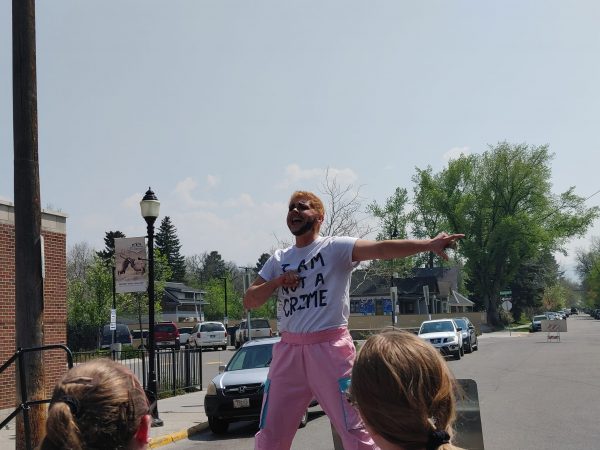
State Representative Zooey Zephyr, (D-Missoula) who is an Out trans Montana lawmaker wrote: “We will not be intimidated by hatred here in Montana. Pride is our sanctuary. Pride is our protest. Pride is our continuous source of joy. And we will not let hatred take that joy away. We will dance, sing, and celebrate in defiance of the hatred that demands our silence.”
We will not be intimidated by hatred here in Montana.
— Rep. Zooey Zephyr (@ZoAndBehold) May 20, 2023
Pride is our sanctuary. Pride is our protest. Pride is our continuous source of joy. And we will not let hatred take that joy away.
We will dance, sing, and celebrate in defiance of the hatred that demands our silence. https://t.co/Cn3rf7HzvW
ABC Fox Bozeman KFBB-TV also reported:
The group walked up and down Main Street and other side streets while engaging with bystanders who shouted back at them.
One bystander who engaged, Joseph Wood, ended up getting assaulted.
Wood said he was walking near the group when one protester handed him a flyer. He continued walking near them and another protester tried blocking his path.
They ultimately got into a verbal altercation that escalated into the man hitting Wood in the face with a shield, then another man pepper sprayed him.
“He didn’t like that. So, he checked me with the shield, and then they, like, reached around and this dude, this dude with, like, he literally, like, hand comes from here point blank in my left eye. Like, the most painful part was that I could feel it, like in going into the eye, not just like spicy on top,” Wood said.
KFBB also noted that the white supremacist anti-LGBTQ+ protestors left almost immediately after the pepper spray was deployed and as Bozeman Police and fire department personnel arrived to take care of Wood.
He made a statement to the police then spent time in an ambulance getting his eyes and face flushed with saline solution.
Montana
Montana’s GOP Governor Gianforte signs TikTok ban
The Chinese-owned social media platform will be illegal in Montana starting Jan. 1, 2024, barring a successful court challenge
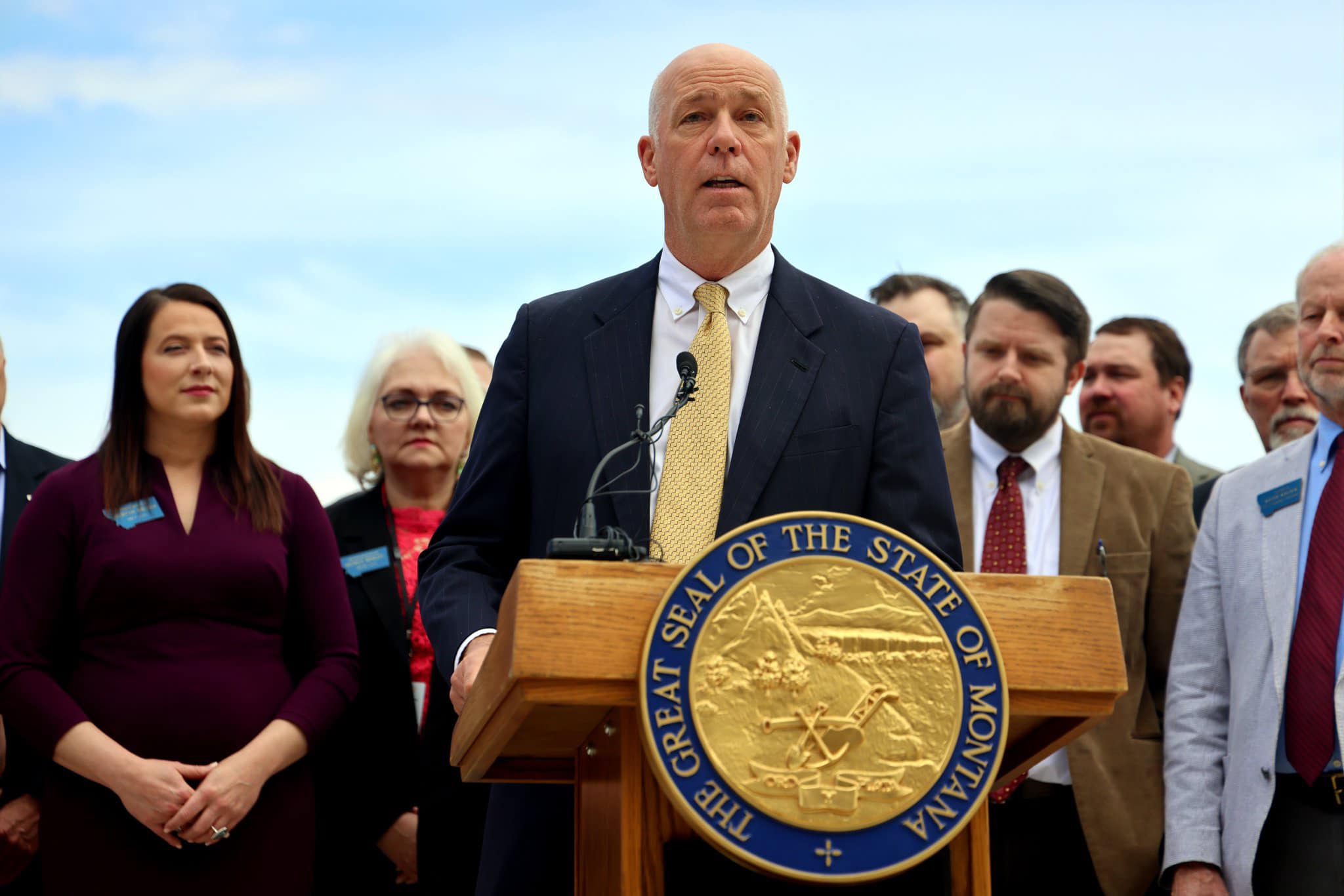

HELENA – Gov. Greg Gianforte announced Wednesday that he had signed a bill banning Chinese-owned social media platform TikTok over concerns its data-sharing practices jeopardize user privacy and national security.
The ban, which the governor’s office said was the first of its kind in the nation, is set to take effect Jan. 1, 2024, unless it is blocked in court.
“The Chinese Communist Party using TikTok to spy on Americans, violate their privacy, and collect their personal, private, and sensitive information is well-documented,” Gianforte said in a statement. “Today, Montana takes the most decisive action of any state to protect Montanans’ private data and sensitive personal information from being harvested by the Chinese Communist Party.”
The company, owned by ByteDance, and the American Civil Liberties Union have said they intend to challenge the law, Senate Bill 419, as a violation of constitutionally protected free speech.
“With this ban, Governor Gianforte and the Montana legislature have trampled on the free speech of hundreds of thousands of Montanans who use the app to express themselves, gather information, and run their small business in the name of anti-Chinese sentiment,” ACLU of Montana Policy Director Keegan Medrano said in a statement.
A TikTok representative also criticized the law in a statement Wednesday.
“Governor Gianforte has signed a bill that infringes on the First Amendment rights of the people of Montana by unlawfully banning TikTok, a platform that empowers hundreds of thousands of people across the state,” said TikTok spokesperson Brooke Oberwetter. “We want to reassure Montanans that they can continue using TikTok to express themselves, earn a living, and find community as we continue working to defend the rights of our users inside and outside of Montana.”
The law will bar ByteDance from allowing “the operation of tiktok by the company or users” inside Montana’s “territorial jurisdiction” as long as the platform is owned by a company based in China or another country designated a “foreign adversary” by the federal government.
The law will also make it illegal for companies like Apple and Google to let their users download the platform’s app from their respective app stores. It does not include provisions that would allow the state to prosecute individual Montanans for circumventing the ban.
The law will be enforced by the Montana Department of Justice, which has the power to levy fines of up to $10,000 a day for violations.
Gianforte, a Republican, had previously signaled he would sign the bill in an email exchange where his office suggested amendments that would have expanded the bill’s scope to to apply to all social media platforms that allow users’ personal data to be provided to nations the federal government designates as “foreign adversaries.” Those revisions were nearly identical to an amendment brought by Democrats while the bill was debated on the House floor, where they were resisted by Republican supporters of the ban who argued the changes would make the bill “unworkable.”
The governor also issued a memo Wednesday directing state agencies to ban the use of other China- and Russia-based social media apps on state devices and networks. That ban, effective June 1, will cover ByteDance apps CapCut and Lemon8 in addition to TikTok, as well as Tencent’s WeChat, Pinduoduo’s Temu and Russia-based Telegram Messenger.
“One of government’s chief responsibilities is to keep its citizens – and their personal, private, sensitive information and data – safe and secure,” Gianforte wrote in that memo. “Foreign adversaries’ collection and use of Montanans’ personal information and data from social media applications infringe on Montanans’ constitutionally guaranteed individual right to privacy.”
*****************************************************************************************

Eric Dietrich, Deputy Editor
Eric came to journalism in a roundabout way after studying engineering at Montana State University in Bozeman (credit, or blame, for his career direction rests with the campus’s student newspaper, the Exponent). He has worked as a professional journalist in Montana since 2013, with stints at the Great Falls Tribune, Bozeman Daily Chronicle, and Solutions Journalism Network before joining the Montana Free Press newsroom in Helena full time in 2019.
**********************
The preceding piece was previously published by Montana Free Press and is republished with permission.
-

 Breaking News1 day ago
Breaking News1 day agoMajor victory for LGBTQ funding in LA County
-

 Features1 day ago
Features1 day agoKoaty & Sumner: Finding love in the adult industry
-

 a&e features4 days ago
a&e features4 days agoLatina Turner comes to Bring It To Brunch
-

 Books3 days ago
Books3 days agoTwo new books on dining out LGBTQ-style
-

 Television5 days ago
Television5 days ago‘White Lotus,’ ‘Severance,’ ‘Andor’ lead Dorian TV Awards noms
-

 Miscellaneous13 hours ago
Miscellaneous13 hours agoCan you really find true love in LA? Insights from a queer matchmaker
-

 El Salvador2 days ago
El Salvador2 days agoLa marcha LGBTQ+ desafía el silencio en El Salvador
-

 Arts & Entertainment13 hours ago
Arts & Entertainment13 hours agoIntuitive Shana gives us her hot take for July’s tarot reading


